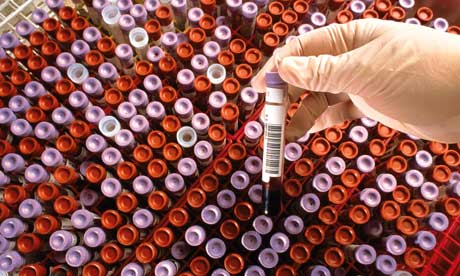
Hundreds of thousands of people living in areas with high HIV infection rates face pressure to be tested for the virus under new plans designed to curtail its spread.
NHS staff will be told to "offer and recommend" tests to all those who use A&E services and register as new patients with GP practices in high prevalence areas in England. This move effectively forces patients to opt out of the testing.
In areas where more than two in 1,000 adults have been diagnosed with HIV, anyone who has a blood test for any reason should be offered a test for the virus too, according to guidance issued by the National Institute for Health and Clinical Excellence (Nice).
The testing will cost nearly £16m a year and affect 37 primary care trusts, 26 of which are in London. Those outside the capital include Blackpool, Brighton and Hove, Birmingham, Leicester, Manchester and Milton Keynes.
The policy, say its supporters, should lessen the stigma sometimes affecting gay men and black Africans, who make up significant proportions of those with the condition. Instead, HIV testing will become a more routine part of NHS healthcare.
Ben Tunstall, of the Terrence Higgins Trust, said the guidance was a vital step forward. "We urge anyone having sex with different partners to make regular HIV testing a priority. These guidelines need to be put into practice to combat onward transmission of HIV and reduce the unacceptably high levels of undiagnosed HIV that we're still seeing in the UK."
Keith Radcliffe, president of the British Association for Sexual Health and HIV, said: "The later people are diagnosed with HIV the more difficult and expensive it is to treat them, the poorer their outcome may be and the more likely they are to have transmitted the infection."
Mike Kelly, director of the centre for public health excellence at Nice, said: "For many people of black African heritage there is a fear that being diagnosed HIV positive will result in social exclusion, or racism and prejudice from both inside and outside their community. As such there is often a reluctance to be tested, which can significantly delay diagnosis."
Nice is acting on recommendations from health professionals, including the Health Protection Agency (HPA), to take a tougher line on testing.
The move also endorses the policy of the British HIV Association of offering tests to patients attending genito-urinary and sexual health clinics, antenatal and abortion services, or drug dependency programmes, and those treating people with TB, hepatitis or lymphoma.
The guidance was published alongside HPA figures suggesting that 46% of 6,750 estimated new HIV diagnoses in the UK last year were linked to sex between men, half were thought to be through heterosexual contact, with the rest attributed to causes such as infected needles, contaminated blood products and mother-to-child transmission.Of the new diagnoses, 3,780 people are thought to have acquired HIV in the UK rather than abroad, a figure that has doubled in the last decade. It includes 2,530 men who had had sex with men, and 1,150 people who were probably infected through heterosexual contact.

